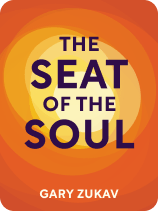

This article is an excerpt from the Shortform book guide to "The Seat of the Soul" by Gary Zukav. Shortform has the world's best summaries and analyses of books you should be reading.
Like this article? Sign up for a free trial here .
Where is your soul on its journey toward enlightenment? How can you further your soul’s evolution?
In his book The Seat of the Soul, Gary Zukav argues that the purpose of the soul is to evolve. This isn’t always easy, and he offers ideas on how to encourage the soul’s journey toward its goal of enlightenment. He explains how to develop your heart knowledge and seek authentic power. He also discusses how spiritual psychology could help all of us in this evolution.
Keep reading for Zukav’s insights on the soul’s journey.
The Soul’s Journey
Our lower selves (personality) may be preventing our souls from evolving. How do we correct this so we can find our soul’s purpose and follow it? Zukav explains that encouraging the soul’s journey involves developing our intuition, listening to our heart, and tuning in to our emotions, which will allow us to be guided by our soul. And, he says, we must learn to seek our internal power and let go of our pursuit of external power. Let’s take a look at how he advises going about doing these things.
Develop Your Heart Knowledge
To understand what our soul needs in this lifetime, we need to learn to listen to our hearts, Zukav says, which begins by attuning to our feelings. When we’re in touch with our deeper emotions, we can understand them as messages from our soul and from other spirit guides out in the universe. This constitutes an intuitive way of knowing and understanding the world with the heart rather than the mind, which Zukav describes as a sixth sense. This means valuing emotions and being in touch with our feelings. This deeper awareness of our feelings, he says, will guide us in decision-making. If you’re not sure whether to pursue a particular course of action, tuning in to the feelings in your heart will tell you which way to go.
Intuition, as Zukav defines it, is the sense beyond our ordinary five senses that’s connected to universal wisdom. It’s your soul speaking to your higher self. According to Zukav, we tend to emphasize knowledge of the mind and spend much time developing it and training it, yet we don’t spend time developing our intuitive knowledge. In fact, we often dismiss it entirely. He says when we have a “gut feeling” or a hunch about something, we need to pay attention to those things, and not dismiss them. Those are products of our intuitive sense.
| Align With the Spiritual Realm In The Seven Spiritual Laws of Success, Deepak Chopra says that aligning with the spiritual realm is crucial for a successful purpose-filled life. Like Zukav, he argues that without that connection to something spiritual, you’ll have an incomplete and inaccurate perception of reality. Chopra also says that lack of connection leads to a life of fear and anxiety, since you’ll have no higher guidance, and you’ll get caught up in shallow material pursuits, which are ultimately unsatisfying. In order to begin to align yourself with your soul, or the spiritual realm outside of yourself, try the exercises in the Shortform guide to The Seven Spiritual Laws of Success. |
If you’re in tune with your soul, Zukav says, you’ll know you have a higher guidance. Your lower self doesn’t realize this, so it isn’t able to draw upon that resource, which means you’ll have to learn lessons the hard way, in the physical realm. If you’re tuned in to your intuitive sense, you can access universal guidance and make more conscious choices based on that higher knowledge. To this end, Zukav offers some advice for working on developing your intuitive sense to encourage the soul’s journey. He says this involves the following:
- “Emotional cleansing”: This means tuning in to your emotions and processing them in healthy ways—he warns us not to repress emotions, because that creates blockage and disease.
- Dietary cleansing: Eat a healthy, clean, non-toxic diet.
- Setting intentions: In order to change your thoughts and actions, and therefore your energy, Zukav says you should consciously set intentions. If you are conscious of the intentions behind your actions, you can make more conscious choices based on those, and that will change your reality.
- Trusting your gut: Consciously try to listen to your feelings and hunches.
- Being open and believing: Be receptive to any messages you receive, and believe in them. Believe that everything happens for a reason.
(Shortform note: Jack Canfield, author of The Success Principles, offers a more focused approach that may be easier to implement than Zukav’s advice. Canfield’s seven steps for tuning in to your intuition include devoting time each day to asking your intuition questions and acting immediately on the information you receive.)
| Setting Powerful Intentions While Zukav doesn’t explain how to set intentions, Deepak Chopra also offers some concrete advice. He says “everything that happens in the universe begins with intention” and that an intention is like a seed from which something will grow. So you must take care to plant those seeds consciously and to nurture them. Some steps to setting intentions effectively are: Meditate, to clear your mind of its chatter and get to a place of still, quiet consciousness. Think about your intention (what you want to manifest) while you’re in a meditative state, and then let it go—put it out there, and then stop thinking about it. Discard any negative beliefs or criticisms from yourself or others, and know that everything will be as it should be. Don’t dwell on the outcome, as this creates anxiety. Just let it be, and trust the universe. |
Seek Authentic Power
Once you’ve honed your intuition so that you can listen to your heart knowledge and be guided by your soul, Zukav says, you need to let go of any pursuit of external power and discover your internal power—the power of your soul. In this way you become authentically empowered to live out your soul’s purpose.
The spiritually powerful person realizes that materialistic power is unstable and can’t last, and therefore it isn’t truly power, Zukav says. Spiritual power comes from within, from one’s soul and that soul’s connection to the loving power of the universe. So a spiritually powerful person is:
- Humble
- Harmless
- Non-competitive
- Non-materialistic
- Free to be themselves
- Forgiving
- Wise
- Loving
Zukav says you can learn how to distinguish between what are your genuine needs and what are illusions by contemplating these qualities and considering whether your pursuits are aligned with cultivating those, or not. What things do you perceive yourself “needing” just because it’s conditioned into you, or because you’re seeking external power? What does your soul really need, versus what do you as a flawed five-sensory human think you need?
| Be Present In The Power of Now, Eckhart Tolle discusses the distinction between your true being and your ego. To learn what your genuine needs are, you first have to learn to distinguish between the two, so you can identify what is your true being. According to Tolle, the most fundamental part of discovering your true being, is to learn to be in the present. Ruminating on the past or worrying about the future will keep you disconnected from your true being and in the space of your ego, which is essentially your thinking mind. While Zukav argues that your emotions are messages from your soul that you need to tune in to, Tolle argues, by contrast, that emotions arise from the mind and so are also associated with your ego, and they act as roadblocks to connecting with your true being. So, according to Tolle, you need to begin to disconnect from both your thinking mind and your emotions, through mindfulness, to get in touch with your true nature. Then, in that still and quiet space when you are fully in the present, you can begin to assess what your genuine needs are. |
In order to move in the direction of spiritual power, Zukav emphasizes embracing prayer and faith. Setting intentions and meditating are not enough, he says. These are parts of prayer. But, to communicate with your spirit guides, Zukav says you need to actually talk to them, and ask them for guidance. And when you do that, you must actually believe in them, have faith that they’ll guide you, and trust them to do that.
In addition to prayer and faith, as part of the work of tapping into your spiritual power, Zukav offers a few more action items to help shift your perspective:
- Act from your heart, not your mind. To do this, become more conscious of your feelings, and see them as signs and messages meant to guide you.
- Open yourself to connection with other spiritual humans.
- Live mindfully, in the present. Let go of fears and anxieties about the past or future. Just be here now.
- Think of yourself as a spiritual being in a material body, rather than a material being with a spirit.
| Open Your Heart Chakra To understand what it means to act from your heart, or listen to your heart knowledge, we might turn to another Oprah Winfrey favorite, The Untethered Soul. In this book, Michael A. Singer offers further advice for discovering your true self, through opening your heart chakra. Chakras are understood in the Hindu tradition as energy centers throughout your body. There are seven major chakras; the one that resides in your heart center is called anahata, and is associated with love and compassion. When energy isn’t flowing freely in your chakras, they’re said to be blocked, and you must do spiritual work to unblock them. Singer tells us that your heart chakra can become blocked, or closed, due to past experiences, and that you need to consciously address these blockages to fix them. He offers some advice for opening your heart chakra, by paying close attention to the energy flow as you feel it in your heart and learning to release the negative energy. There are also many guided meditations you can use to practice opening your heart chakra, so that you’re better able to tap into your “heart knowledge.” |
Spiritual Psychology
As a final suggestion for spiritual evolution, Zukav offers a recommendation for moving humanity as a whole toward enlightenment. Since we all energetically affect one another and are all tied into the same universal consciousness, we must cooperate with one another to move humanity forward. To this end, Zukav advocates for developing the discipline of “spiritual psychology.” He says this would be a shift in the field of psychology toward examining the spiritual roots of mental illnesses. We should be approaching personality disorders, he says, as fragmentation of the self due to the soul’s karma, and to the multiple lifetimes lived by the soul. If a person’s soul has lived many different kinds of lives, their likes and dislikes and fears and fascinations may all be derived from those. So, for example, phobias might be understood as related to a trauma from your soul’s past life.
| Shamanism and Spiritual Psychology In an indigenous worldview, spirituality and psychology would never be considered separate realms; they would be approached by traditional healers as intertwining aspects of a person. In the article What a Shaman Sees in a Mental Hospital, Malidoma Patrice Somé, a shaman of the West African Dagara tribe, discusses his impression upon observing patients in an American mental health facility. From his cultural perspective, he sees people who are spiritually gifted, or undergoing spiritual crises, being restrained and prevented from going through a necessary spiritual process. He says that the characteristics viewed as “psychotic” from a Western psychology model, are viewed in the Dagara culture as symptoms of a spiritual calling or transformation, and that the response to them would be one of community support. The person is viewed as a healer being born, and the shaman and community approach them as such, guiding them through the process of integrating their spirit and mind, and emerging as a healed, and whole, person. Thus the concept of spiritual psychology proposed by Zukav is akin to a shamanic view of psychology. The documentary film, Crazywise, explores this theme as well, and includes discussion with Western psychologists who are coming to recognize and embrace the value in the shamanic approach. |
Guiding people to understand and develop their intuition would also be part of Zukav’s spiritual psychology. Intuition is the conduit for us to understand these soul-based parts of ourselves, and it aligns us with a knowledge of what our soul needs for its evolution.
Zukav also says that when we deny our soul’s existence, and therefore its needs, we cut ourselves off from all the spiritual guidance available to us. This can lead to personal crises. This is why we need to address the spiritual through psychology.
We humans chose the path we’re on, Zukav says; we were given free will. We didn’t need to choose fear and violence, and other negative courses of action. But we did. And this means we now need to find our way back toward the light and healing. Therefore, Zukav concludes, since we’re at that evolutionary turning point, where we’re learning to recognize our souls, we need guidance through spiritual psychology.
| Christian Psychology Aside from indigenous traditions, even in the modern Western world, taking a spiritual or religious approach to human psychology is not a new idea. Although the merging of the two has often been discouraged in the mainstream scientific community, throughout history, behavioral scientists have been influenced by religious doctrine in their understanding of mental illness as well as approaches to healing. Today in the Western world, Christian psychology is a fairly common practice, involving understanding the human being through the Biblical scriptures. This approach to psychology, similar to what Zukav suggests, addresses the spiritual needs of the soul, as inseparable from the mind, and rests on the premise that humans in their material form are inherently flawed. |

———End of Preview———
Like what you just read? Read the rest of the world's best book summary and analysis of Gary Zukav's "The Seat of the Soul" at Shortform .
Here's what you'll find in our full The Seat of the Soul summary :
- An exploration into your soul’s purpose
- How to align your life with your soul's purpose
- How humans have become disconnected from their spiritual natures






